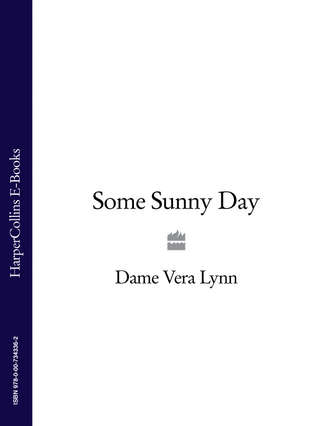
Полная версия
Some Sunny Day
That was perfectly fair and above board. But this was also the golden age of ‘plug money’, the undisguised backhander from a publisher’s plugger to a bandleader or a singer in exchange for an undertaking to perform a given song over the air. Some bandleaders made a lot of money in this way, and some vocalists, too, did quite well out of it. But apart from the ethics of the thing, it always struck me as a very dangerous game to play. The risk of being stuck with an unsuitable number appeared to me to far outweigh the short-term benefit of a tax-free fiver. A singer should be grateful for the occasional right song when it comes along, for it’ll do her more good than any amount of under-the-counter subsidy. I was the target of this sort of approach, of course, because as soon as anyone started broadcasting they’d be sent stacks of music, and one or two people left you in no doubt that there’d be a little something for you in an envelope if you just happened to choose the piece they were working on. But it quickly became obvious that I had very clear ideas of what lay within my emotional and technical range, and wouldn’t be diverted from them, and after that I was left alone.
It was at this period—on the edge of big things, as it were—that I realized that the entertainment business could bring conflicting emotions. One day, going up to the West End on the bus on the way to do a broadcast, with my cloth coat over my long dress and my song copies rolled up under my arm, I’d be assailed by two contradictory feelings at once. I’d be so nervous that I would find myself wishing that something—anything—would happen to the bus to hold it up so that I wouldn’t have to go. Why have I let myself in for all this? I’d ask myself as we rattled down the East India Dock Road. At the same time I used to get a little smug glow out of looking at the other passengers and thinking, Wouldn’t all you lot be surprised to know that this young lady sitting so quietly in the middle of you was on her way to do a broadcast?
Within a few weeks of starting to broadcast with Charlie Kunz I was also making records with the Casani Club Band. The first one was ‘I’m in the Mood for Love’, a very pretty Jimmy McHugh-Dorothy Fields song from a 1935 film called Every Night at Eight. It’s extremely satisfying to know that not only was it popular at that time, but it went on being popular and became a standard. It wasn’t a hit for me particularly, but at least it meant I could rely on my nose for a good song. That wasn’t my first record, though. Right at the start of 1935 I’d gone into a private studio with Howard Baker’s band and recorded a song called ‘Home’. It was on the label of Teledisk, a firm which specialized in making records for individuals—a bandleader might have one of his own broadcasts recorded, for example—and it was never issued commercially. In the spring of 1935 I also began to record anonymously for the Crown label; they made those eight-inch records that were sold in Woolworth’s. Strangely enough I sold over a million records on the Crown label long before I was known as the Forces’ sweetheart. They also produced all sorts of people no one will remember now: Al Jolson, Al Bowlly, Mrs Jack Hylton and the unlikely star Sir Henry Cooper (who sang ‘I’m Enery the Eighth, I Am’). They would have a popular song on one side of the record and a song nobody knew on the other.
I feel sad in a way that I never walked into a branch of Woolworth’s and saw one of my records—or at least I don’t remember ever doing that. Years later in 2008 when Wool-worth’s shut down, nostalgic news reports made much of the fact that I made my first record with them. I knew people bought the records—otherwise they wouldn’t have kept on making them—but I never saw a copy of one of my records in someone else’s house. I was on ever so many Crown records after that, though sometimes with Rossini’s Accordion Band and all sorts of strange little groups. The name of the firm that actually made them was Chrystallate, and their musical director was a well-known bandleader from what you might call the second division of British dance orchestras of the day, Jay Wilbur. Chrystallate had studios in Broadhurst Gardens, West Hampstead, which became the Decca studios when Decca took over the firm in 1938. Crown’s policy was to put a popular song—a published copyright song—on one side of the record, and a song nobody knew, an unpublished number which they bought outright from the composer, on the other. They snapped up hundreds of such songs at ten pounds a batch and they’d go through them every so often to see what would suit any given artist.
For Crown, although at first I appeared completely anonymously, as time went on and my name began to have a little value I was billed on the label, in small letters: ‘With Vocal Refrain by Vera Lynn’. I didn’t get any more money for that, but it was assumed that it helped the record a little. I never, incidentally, recorded under another name. It was Vera Lynn or nothing.
Конец ознакомительного фрагмента.
Текст предоставлен ООО «ЛитРес».
Прочитайте эту книгу целиком, купив полную легальную версию на ЛитРес.
Безопасно оплатить книгу можно банковской картой Visa, MasterCard, Maestro, со счета мобильного телефона, с платежного терминала, в салоне МТС или Связной, через PayPal, WebMoney, Яндекс.Деньги, QIWI Кошелек, бонусными картами или другим удобным Вам способом.


